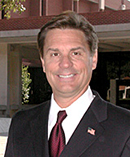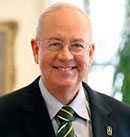Within five days, some Baylor University regents told a national newspaper about gang rapes allegedly perpetrated by football players, and the school’s chief operating officer acknowledged Baylor’s campus police failed for more than a year to respond to a reported gang rape.
Also, Baylor’s immediate past-president released a chapter from a book describing his tense relationship with a former chair of the board of regents that predated the university’s sexual assault scandal.
The reports bookended a weekend in which the previously undefeated Baylor Bears’ loss to the Texas Longhorns on a last-minute field goal barely merited mention.
Greater transparency promised
But they also preceded a public statement by Baylor Interim President David Garland pledging greater transparency.
 Baylor Interim President David Garland issued a directive that the university “be more transparent whenever possible about the sexual assault crisis” at Baylor.“We are working diligently to ensure that Baylor University fulfills its mission to be a caring Christian community where our students thrive. As a part of this commitment, I have directed the university to be more transparent whenever possible about the sexual assault crisis that has severely impacted our campus, our alumni and the entire Baylor family,” Garland said.
Baylor Interim President David Garland issued a directive that the university “be more transparent whenever possible about the sexual assault crisis” at Baylor.“We are working diligently to ensure that Baylor University fulfills its mission to be a caring Christian community where our students thrive. As a part of this commitment, I have directed the university to be more transparent whenever possible about the sexual assault crisis that has severely impacted our campus, our alumni and the entire Baylor family,” Garland said.
“Both the administration and the board of regents are taking this step because we came to understand that, in order to heal, the Baylor family needs more information about what happened and why.”
Baylor launches new webpage
Garland announced Baylor launched a new webpage, www.baylor.edu/thetruth.
Sign up for our weekly edition and get all our headlines in your inbox on Thursdays
“We will be providing more details about what happened at Baylor and about our ongoing efforts to learn from our mistakes and to make the right decisions moving forward,” he said.
Baylor will use the site to “disclose important facts, provide a clear accounting of past Title IX incidents including sexual assaults on our campus, report about developments on a timely basis and respond to media coverage when appropriate,” he said.
Problem was ‘staggering’
Garland acknowledged the scope of sexual assaults at Baylor.
“The evidence shows that the breadth of the problem was staggering within the university and within the football program,” Garland said, confirming 17 victims reported assaults by 19 football players.
“Four of these involved alleged gang rapes that were reported to have occurred in 2012,” he added.
Regents disclose additional details
In a Wall Street Journal article published Oct. 28, some Baylor regents first revealed previously undisclosed details from the Pepper Hamilton investigation into the university’s handling of sexual assault complaints.
The same day the Journal published its article, two additional women signed on as the ninth and 10th plaintiffs included in a Title IX lawsuit against Baylor filed in U.S. District Court.
The Journal interviewed three regents, quoting Chairman Ron Murff and J. Cary Gray, regarding the investigation that led to the removal of Ken Starr as president and Art Briles as head football coach, as well as the sanctioning of Athletic Director Ian McCaw, who resigned.
Briles allegedly knew about one assault and failed to report it
The regents said 17 women reported sexual or domestic assaults that involved 19 football players, including four gang rapes, since 2011. In at least one instance, regents told the Journal, Briles knew about an alleged gang rape involving some of his players and did not report it to the university’s Title IX office or its judicial-affairs office.
“There was a cultural issue there that was putting football games above everything else, including our values,” Gray told the Journal. “We did not have a caring community when it came to these women who reported that they were assaulted. And that is not OK.”
The Findings of Fact document regents released after the Pepper Hamilton law firm completed its investigation cited concerns about “the tone and culture within Baylor’s football program as it relates to accountability for all forms of student athlete misconduct.”
The Journal also reported football players were involved in 10.4 percent of the Title IX-reported incidents in the four-year period ending in 2014-15.
Baylor University released a brief statement regarding the article: “The Wall Street Journal interviewed three Baylor regents who reflect the experiences of a majority of board members. Their statements stand on their own merit. The board also expresses its support for the coaches and players who are working to rebuild trust in the program.”
‘Significant failure’ by Baylor campus police
In an interview with 60 Minutes Sports that aired Nov. 1 on the Showtime cable network, Reagan Ramsower, Baylor’s chief operating officer and senior vice president, acknowledged Baylor’s campus police failed for more than a year to act on a sexual assault complaint against former Bears tight-end Tre’Von Armstead and former Bears linebacker Shamychael Chatman.
 Reagan Ramsower“It never came out of the police department,” Ramsower said. “That was a significant failure to respond by our police department; there’s no doubt about it.”
Reagan Ramsower“It never came out of the police department,” Ramsower said. “That was a significant failure to respond by our police department; there’s no doubt about it.”
However, when asked by the reporter if the incident was not pursued because the police were “protecting the football team and protecting that brand,” Ramsower replied, “I don’t believe that was at all the reason.”
60 Minutes Sports also interviewed Patty Crawford, Baylor’s first full-time Title IX coordinator, who resigned Oct. 3. She filed a complaint alleging Baylor’s noncompliance with Title IX that led the U.S. Department of Education’s Office of Civil Rights to initiate an investigation of the university.
Call for ‘full accounting’ to the Baylor family
The Baylor Line Foundation called on the university to give a “full accounting” directly to the “Baylor family.”
“Some members of the board of regents have given media interviews that seem to be a part of a carefully orchestrated public relations campaign to validate their staffing decisions rather than explaining what happened directly to the Baylor family,” the foundation said in a public statement released Oct. 30.
“The Baylor Line Foundation has long believed that a full accounting must be given directly to the Baylor family, not just selected news media—no matter how credible they might be,” the statement continued.
“We agree that the privacy of those who have filed complaints must be protected, but there are many unanswered questions that have nothing to do with the primary goal of protecting the survivors.
“In the interest of transparency and credibility for Baylor University, especially in relation to the terminations of key leadership, details about the actions of our board of regents—actions that Pepper Hamilton clearly had issues with—must be made public. The Baylor Line Foundation renews its call for Baylor to return to the timeless Christian values fundamental to the university since its founding in 1845.”
The Baylor Line Foundation was formed as part of a legal settlement between the Baylor Alumni Association and the university. Under terms of the settlement, the alumni association agreed to remain an independent nonprofit entity and change its name, and the renamed entity was granted authority to continue to publish the Baylor Line with editorial and operational independence. Also, the regents agreed to add three alumni-selected representatives to the university’s governing board.
Starr reports longstandihng tension with some prominent regents
Longstanding tension between the Baylor Alumni Association and university regents contributed to a deteriorating relationship between Baylor’s immediate past president and some members of the governing board, according to a book Starr is writing.
 Ken Starr Starr submitted a chapter from his book, Bear Country, to the Waco Tribune-Herald, and the newspaper published it as a guest column Oct. 30.
Ken Starr Starr submitted a chapter from his book, Bear Country, to the Waco Tribune-Herald, and the newspaper published it as a guest column Oct. 30.
Starr describes how he came close to resigning three times during his six-year tenure as Baylor’s president, as the board increasingly tried to shift his role from chief executive to a nonexecutive fundraiser.
“For various reasons, I was not satisfying the board’s vision of a CEO,” he writes. “In their view, I was to be, instead, an outside person who built the university through raising money.”
Problems predated Pepper Hamilton
Disagreements with the regents had been building long before Pepper Hamilton began its investigation, he insists.
He writes about one incident during Baylor’s 2011 homecoming when he threatened to resign due to “unacceptably inappropriate conduct” and comments by then-chairman of the board of regents, Buddy Jones.
At halftime during the homecoming game, Joy and Kent Reynolds—widow and son of former Baylor President Herbert Reynolds—presented awards to several people on behalf of the Baylor Alumni Association.
“The chairman of the Baylor board of regents was displeased,” Starr writes. “In strong language, both in person and in writing, he expressed profound displeasure with the university for having permitted its platform to be used by the BAA to carry on its unwelcome mission. Chairman Jones’ disapprobation was severe, and it was strongly expressed.”
Jones’ comments, later revealed in emails that came to light during litigation between the university and the alumni association, undermined Starr’s stated intent to treat the Baylor Alumni Association with “courtesy, respect and hospitality,” Starr asserts.
“I had restated that policy again and again,” he writes. “Here, however, was a clear instance of the board of regents’ leadership seeking to overrule the administration and employing crude language that in my view was inappropriate for a Christian institution. I thought that entirely improper.”
Baylor did not provide any public statement in response to questions about Starr’s book.
Editorial points to unanswered questions
On Nov. 1, the Dallas Morning News renewed its call for Baylor to release a written report on sexual assault. In an editorial article, “Baylor regents say Briles mishandled one case, but what about all the other sexual assault reports?” the newspaper’s editorial board asserted regents who spoke to the Wall Street Journal released “a few bombshells of information but left too many questions unanswered.”
The information the regents provided explained “why Briles and former university President and Chancellor Ken Starr needed to go,” the article said.
“But the board of regents needs to do far more to assure the public—most particularly the families who trust Baylor with their children’s safety—that those who remain in charge deserve their trust,” the editorial stated. “Much remains unsettled in this scandal, especially when it comes to the school’s conduct and motives.”
Baylor and its football program ‘needed new leadership’
In his Nov. 1 statement, Garland again emphasized lawyers from Pepper Hamilton presented their findings to the board of regents and some administrators but “they never created or delivered a written report.”
However, “faced with the weight of the information from Pepper Hamilton, the regents concluded by an overwhelming majority that Baylor University and its football program needed new leadership,” he said. “No other university faced with similar circumstances has moved as decisively to change leadership at the highest levels—its president, athletic director and head football coach.”
“These painful, often agonizing decisions were not based on specific incidents—but on the extent of the problems, organizational shortcomings and repeated failures to care for those who came forward to report sexual violence,” Garland continued. “With regard to assistant football coaches and other administrators, we decided it would be unfair to remove those further down in the organization for the mistakes of their leaders.”
‘Committed to healing our Baylor family’
Initially, Baylor leaders considered the release of the Findings of Fact and progress reports on implementation of the 105 recommendations by Pepper Hamilton as evidence of the school’s “commitment to disclosure and reform,” he said.
“Since then, however, it has become obvious that our faculty, staff, students, alumni and community all needed and deserved more information. We are committed to healing our Baylor family,” Garland said. “It is with this in mind that we are now discussing more openly what Baylor has learned over the past year.”
The support and comfort of victims affected by sexual violence and Baylor’s “institutional failures to respond appropriately will remain foremost in our hearts and our actions,” he pledged.
“Anyone who has had firsthand experience of sexual assault understands that many victims go through a deep sense of shame, guilt and fear,” he said. “Some may be afraid that no one will listen to them or believe them or that they will be the targets of retaliation. These incidents may leave lifelong scars. This is the reason we are working so hard to remove barriers to reporting and to provide a supportive environment for our students.
“That Baylor did not respond as a caring Christian community to those who were hurt grieves all of us—regents, administrators, faculty and staff. On behalf of everyone at Baylor, I want to apologize again to the victims and their families. I will do all I can to ensure this never happens again.”
















We seek to connect God’s story and God’s people around the world. To learn more about God’s story, click here.
Send comments and feedback to Eric Black, our editor. For comments to be published, please specify “letter to the editor.” Maximum length for publication is 300 words.